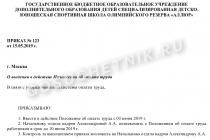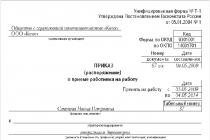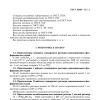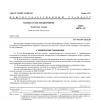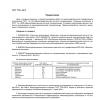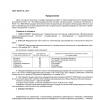Commentary on Article 333
1. For teaching staff reduced working hours are provided for, which should not exceed 36 hours a week, which is associated with the special nature of their work, which requires considerable intellectual and nervous tension.
2. The upper limit of the teaching load is established for teaching staff by the relevant standard provisions. Study load on academic year for teachers of secondary special educational institutions, stipulated in the employment contract, should not exceed 1440 hours; teaching staff educational institutions higher vocational education- 900 hours per academic year; teaching staff in an educational institution for advanced training - 800 hours.
The upper limit of the teaching load of teaching staff of educational institutions of other types and types is not provided for in the relevant standard provisions.
3. Duration of working hours (the norm of hours of pedagogical work for the rate wages) teaching staff of educational institutions is defined in Decree of the Government of the Russian Federation of April 3, 2003 N 191 (SZ RF. 2003. N 14. Art. 1289).
Pedagogical workers of educational institutions, depending on the position and (or) specialty, taking into account the characteristics of their work, are set the duration of working hours:
36 hours a week - to employees from among the teaching staff of educational institutions of higher professional education and educational institutions of additional professional education (advanced training) of specialists;
30 hours a week - for senior educators of educational institutions (except for preschool educational institutions and educational institutions additional education children);
36 hours a week:
Senior educators of preschool educational institutions and educational institutions of additional education for children;
Teachers-psychologists, methodologists (senior methodologists), social pedagogues, organizing teachers, masters of industrial training, senior counselors, labor instructors of educational institutions;
Heads of physical education of educational institutions of primary vocational and secondary vocational education;
Teachers-organizers (basics of life safety, pre-conscription training) of general educational institutions, institutions of primary vocational and secondary vocational education;
Instructors-methodologists (senior instructors-methodologists) of educational institutions of additional education for children of a sports profile.
The norm of hours of teaching work for the wage rate is:
18 hours a week:
Teachers of grades 5 - 11 (12) of general educational institutions (including cadet schools), general education boarding schools (including cadet boarding schools), educational institutions for orphans and children left without parental care, special (correctional) educational institutions for students (pupils) with developmental disabilities, health-improving educational institutions of a sanatorium type for children in need of long-term treatment, special educational and educational institutions of an open and closed type, educational institutions for children of preschool and younger school age, educational institutions for children in need of psychological and pedagogical and medical and social assistance, interschool educational complexes, training and production workshops;
Teachers of pedagogical schools and pedagogical colleges;
Teachers of special disciplines 1 - 11 (12) classes of musical, artistic educational institutions;
Teachers of grades 3 - 5 of schools of general musical, artistic, choreographic education with a 5-year term of study, 5 - 7 classes of art schools with a 7-year term of study (children's music, art, choreographic and other schools), 1 - 4 classes of children's art schools and schools of general art education with a 4-year term of study;
Teachers of additional education;
Coaches-teachers (senior coaches-teachers) of educational institutions of additional education for children of a sports profile;
Teachers foreign language preschool educational institutions;
20 hours a week - for teachers of grades 1 - 4 of general educational institutions;
24 hours a week - teachers of grades 1 - 2 of schools of general musical, artistic, choreographic education with a 5-year term of study, grades 1 - 4 of children's music, art, choreographic schools and art schools with a 7-year term of study;
720 hours per year - for teachers of primary and secondary vocational education institutions.
The norm of hours of pedagogical work for the wage rate is:
20 hours a week - teachers-defectologists and teachers-speech therapists;
24 hours a week - music directors and accompanists;
25 hours a week - for educators of educational institutions working directly in groups with students (pupils) who have developmental disabilities;
30 hours a week - for physical education instructors, educators in boarding schools, orphanages, groups extended day educational institutions, in school boarding schools;
36 hours a week - for teachers of preschool educational institutions, preschool groups of general educational institutions and educational institutions for children of preschool and primary school age, institutions of additional education for children and institutions of primary vocational and secondary vocational education.
The duration of the working time of pedagogical workers includes teaching (educational) work, educational work, as well as other pedagogical work provided for by official duties and working hours, approved in the prescribed manner.
For teaching work performed with the consent of teaching staff in excess of the established norm of hours for the wage rate, an additional payment is made in accordance with the received wage rate in a single amount in the manner determined by the Ministry of Education and Science of the Russian Federation.
The rate of hours of pedagogical and (or) teaching work for the wage rate of pedagogical workers is set in astronomical hours.
For teachers, professors, teachers of additional education of educational institutions, the norm of hours of teaching work includes the lessons (classes) they conduct, regardless of their duration, and short breaks (changes) between them.
Teachers who cannot be provided with a full teaching load are guaranteed the payment of the wage rate in full, provided that they are supplemented to the established norm of hours by other pedagogical work in the following cases:
Teachers of grades 1 - 4 when transferring the teaching of foreign language lessons, music, visual arts And physical education specialist teachers;
Teachers of grades 1 - 4 of rural general educational institutions with a non-Russian language of instruction, who do not have sufficient training to conduct Russian language lessons;
Teachers of the Russian language in rural primary general education schools with a non-Russian language of instruction;
Teachers of physical culture of rural general educational institutions, teachers of a foreign language of general educational institutions located in the villages of logging and rafting enterprises and chemical forestry enterprises.
Teachers of general educational institutions and teachers of pedagogical schools and pedagogical colleges, whose workload decreases during the academic year for reasons beyond their control compared to the established workload, until the end of the academic year is paid:
Salary for the actual number of hours, if the remaining workload is higher than the established norm for the rate;
Salary in the amount of the rate, if the remaining workload is below the established norm for the rate and if it is impossible to load them with other pedagogical work;
The salary established before the reduction of the teaching load, if it was set below the norm for the rate and if it is impossible to load them with other pedagogical work.
Teachers of institutions of primary vocational and secondary vocational education who, for reasons beyond their control, during the academic year, the teaching load decreases in comparison with the established workload, until the end of the academic year are paid wages in the amount established during the billing at the beginning of the academic year.
Pedagogical workers must be informed about the decrease in the teaching load during the year and about the additional workload with other pedagogical work no later than 2 months in advance.
4. The regulations that determine the rate of hours of pedagogical work for the wage rate of speech therapists and educational psychologists are specified in the letter of the Ministry of Education of Russia dated January 22, 1998 N 20-58-07in / 20-4 "On speech therapists and teachers -psychologists of educational institutions". Thus, the salary rate of speech therapist teachers of all educational institutions, regardless of their departmental subordination, is paid for 20 hours of pedagogical work per week. At the same time, it does not matter in which class the teacher-speech therapist carries out pedagogical activities. Teachers-speech therapists and pedagogues-psychologists of psychological-medical-pedagogical consultations, which are independent institutions, are paid the wage rate for 36 hours of pedagogical work per week.
5. For certain categories teaching staff working in positions, the occupation of which is associated with the risk of infection with mycobacterium tuberculosis, a 30-hour work week is established. Among these workers, according to the List, approved. Order of the Ministry of Health of Russia, the Ministry of Defense of Russia, the Ministry of Internal Affairs of Russia, the Ministry of Justice of Russia, the Ministry of Education of Russia, the Ministry of Agriculture of Russia, the FPS of Russia dated May 30, 2003 N 225/194/363/126/2330/777/292 (BNA RF. 2003. N 37) , include teachers, educators and teachers of additional education of health-improving educational institutions of a sanatorium type for children infected with tuberculosis, teachers, educators and teachers of additional education of the Russian Sanatorium and Rehabilitation Center for orphans and children left without parental care, suffering from various forms of tuberculosis infection, teachers and teachers of additional education of general educational institutions working in hospitals for children suffering from various forms of tuberculosis infection.
6. Features of the regime of working time and rest time of pedagogical and other employees of educational institutions are provided for in the Regulation of the same name, approved. Order of the Ministry of Education and Science of Russia of March 27, 2006 N 69 (BNA RF. 2006. N 32). The mode of work and rest of teachers is determined taking into account the specifics of the activities and mode of operation of educational institutions various types and types. These can be educational institutions with a round-the-clock stay of students or pupils, their stay for a certain time, season, etc.
The mode of working time and rest time of pedagogical and other employees of educational institutions is established by the rules of the internal work schedule educational institution, work schedules, a collective agreement developed in accordance with the Labor Code, federal laws, other regulatory legal acts and the said regulation.
7. Teaching staff are allowed to work part-time, including in the order internal combination both in a different and in a similar position, specialty.
Features of part-time work of pedagogical workers are defined in the Decree of the Ministry of Labor of Russia dated June 30, 2003 N 41 "On the features of part-time work of pedagogical, medical, pharmaceutical workers and workers of culture" (Bulletin of the Ministry of Labor of Russia. 2003. N 8), issued in accordance with the Decree of the Government of the Russian Federation of April 4, 2003 N 197 "On the features of part-time work of pedagogical, medical, pharmaceutical workers and cultural workers" (SZ RF. 2003. N 15. St. 1368).
According to the Decree of the Ministry of Labor of Russia of June 30, 2003 N 41, pedagogical workers have the right to carry out part-time work, that is, to perform other regular paid work on the terms employment contract during their free time from their main job at the place of their main job or in other organizations, including in a similar position, specialty, profession, including cases where reduced working hours are established (with the exception of jobs for which regulatory legal acts Russian Federation sanitary and hygienic restrictions are established).
The duration of part-time work of pedagogical workers (including coaches, teachers, trainers) during the month is established by agreement between the employee and the employer, and for each employment contract it cannot exceed half the monthly norm of working time, calculated from the established duration working week. Therefore, based on the fact that the duration of the working time of pedagogical workers should not exceed 36 hours per week, the duration of part-time work cannot exceed 18 hours per week.
For pedagogical workers (including trainers-teachers, trainers) whose half of the monthly norm of working time for their main work is less than 16 hours per week, the duration of part-time work cannot exceed 16 hours of work per week. For cultural workers engaged as teachers of additional education, concertmasters, choreographers, choirmasters, accompanists, artistic directors, the duration of part-time work cannot exceed the monthly norm of working time, calculated from the established duration of the working week.
The pedagogical work of highly qualified specialists on a part-time basis with the consent of the employer can be carried out in educational institutions for advanced training and retraining of personnel in the main work time with the preservation of wages at the main place of work.
For teachers, the following types of work are not considered part-time jobs and do not require the conclusion (execution) of an employment contract:
A) literary work, including work on editing, translating and reviewing individual works, scientific and other creative activity without occupation position;
B) carrying out technical, accounting and other expertise with a one-time payment;
C) pedagogical work on conditions hourly pay no more than 300 hours per year;
D) consulting by highly qualified specialists in institutions and other organizations in the amount of not more than 300 hours per year;
E) the implementation by employees who are not on the staff of the institution (organization), the management of graduate students and doctoral students, as well as the head of the department, the management of the faculty of an educational institution with additional payment by agreement between the employee and the employer;
E) pedagogical work in the same institution of primary or secondary vocational education, in a preschool educational institution, in an educational institution general education, institution of additional education for children and other children's institution with additional payment;
G) work without holding a full-time position in the same institution and other organization, including the fulfillment by pedagogical workers of educational institutions of the duties of managing classrooms, laboratories and departments, teaching work by managers and other employees of educational institutions, management of subject and cycle commissions, work on the management of industrial training and practice of students and other students, etc.;
3) the work of pedagogical workers in the same educational institution or in another children's institution in excess of the established norm of hours of pedagogical work for the wage rate;
I) work on organizing and conducting excursions on an hourly or piece-rate basis without occupying a full-time position.
Carrying out the work specified in sub. "b" - "g", is allowed during the main working hours with the consent of the employer.
Materials provided by NMC "Humanist".
Teacher's working hours
Working under an employment contract guaranteed
statutory working hours...
Constitution of the Russian Federation, art. 37
· How long is a teacher's work week?
· Can the school administration require mandatory working out of 6 hours a day, even if the teacher's workload is very small?
· What is the maximum number of teaching hours per day?
· What is the allowed number of "windows" in the schedule? What if there are a lot of them?
· Is the teacher required to attend weekly 1.5 hour meetings, can I be punished for non-attendance?
· Should the teacher's working day be reduced on official pre-holiday days?
· Is it legal to issue a subject teacher who is not a class teacher, disciplinary action for the absence at the school-wide parent meeting (they pay only hours for the lessons, this is not discussed in the employment contract, they were not familiarized with official duties against signature)?
· How many hours a day should a teacher (class teacher) work during the summer holidays?
In the most general form, the answer to all these questions can be the following.
Working time is “the time during which the employee, in accordance with the internal labor regulations and the terms of the employment contract, must perform labor obligations» . For teachers, this time (including all types of work performed by a teacher - not only at school, but also in preparation for lessons at home!) Cannot exceed 36 hours.
This is the maximum, not the norm! It says so in the Labor Code and in the law "On Education" . We must also remember that for all employees There is one general norm - 40 hours a week.
The upper limit of the teaching load of teaching staff is not limited by law . According to paragraph 66 model provision about educational institution, the volume of the teaching load of teaching staff is set based on the number of hours according to the curriculum and curricula, staffing, other working conditions in this educational institution.
There is a lower limit - the norm of hours of pedagogical work for the wage rate. Without the consent of the teacher, the employer can reduce his workload only to the rate (teaching load established at the conclusion of the employment contract). Moreover, if the director in the current academic year cannot provide the teacher with the teaching load established for him, he is obliged to keep the teacher's salary not lower than the established norm for the rate ..
At the same time, the working hours of teachers who cannot be provided with a full teaching load and are guaranteed payment of the wage rate in full, are determined taking into account their additional work to the established norm of hours by other pedagogical work. offer him other types of work (circles, electives, individual lessons), the volume of which is regulated by the educational institution.
Speaking about reducing the teaching load, it is important not to forget that the amount of teaching load (pedagogical work) established at the beginning of the academic year cannot be reduced at the initiative of the administration during the academic year, as well as in the next academic year, with the exception of cases of reducing the number of hours according to the curriculum and programs, reducing the number of classes (long-day groups).
When establishing the teaching load for the new academic year for teachers and other pedagogical workers, for whom this general educational institution is the place of main work, as a rule, its volume and continuity of teaching subjects in classes is preserved.
In principle, the teacher has the right to lead arbitrarily a large number of classes. At the same time, it must be remembered that the rate in no normative act is equated to the above 36 hours of total working time.
A proportional increase in the total amount of working time with a load exceeding the rate, for example: “You have 24 hours of workload, which means you have to work 48 hours in total” - is absolutely illegal.
Main legal conflict
The current legislation, setting the working time of a teacher - 36 hours a week, poorly prescribes the mechanism for recording this working time. This mechanism should have been, in accordance with Art. 333 of the Labor Code, spelled out in special decrees of the government of the Russian Federation. But the current working time regulations only confuse the issue.
In accordance with these regulations, all the reader's working time is divided into two parts: "normalized teaching work"(that is, directly lessons, the number of hours for which is easy to determine from the time sheet and work schedule) and" non-standardized pedagogical work carried out during working hours, which are not specified by the number of hours.
It is clear that it is precisely because of these non-normalized parts that most of the conflicts arise. What exactly and how many hours should a teacher do besides teaching? The ruling refers to " official duties provided for by the charter of the educational institution, internal labor regulations, tariff and qualification (qualification) characteristics, and is regulated by schedules and work plans, incl. personal plans pedagogical worker. And this is perhaps the only case in the legislation, which at least somehow mentions the process of accounting for the part of the teacher’s work that is not specified in terms of the number of hours.
Especially interesting here is "including". It is unlikely that in any other area, working time is determined by the personal plans of the employee. Appeal to the teacher's conscience instead of paying him - this specific Soviet invention operates in the Russian school.
What does pedagogical work, not specified by the number of hours, include?
Decree No. 191 and Order No. 96 list so many duties that it is impossible to fulfill them in principle.
This is participation in methodological meetings and in parent meetings, carrying out recreational and educational activities, counseling parents, studying family circumstances and living conditions of students, school duty, etc. We are not talking about preparing for lessons, which is a significant part of pedagogical work. And all these are “ordinary duties”, that is, the teacher does not receive a penny for these types of work.
It turns out that everything depends on how exactly the scope of these duties will be defined in the documents of a particular school. In one school, the director will issue an order for daily mandatory "five minutes", in another - for all teachers to be at their workplaces until a certain hour. There is no legally fixed list, which means that any arbitrariness on the part of the employer is possible.
Even the so-called methodical days(“days of the week free for teaching staff conducting teaching work from holding training sessions scheduled) are not guaranteed by law - it all depends on the compilers of the schedule, that is, on the school administration.
We believe that, since the use of slave and forced labor in the Russian Federation provides for criminal liability, there should not be such a thing as “a part of the pedagogical work of an employee conducting teaching work that is not specified by the number of hours”.
Any labor activity should have strict limits on the number of hours and, in our opinion, it is necessary to strictly take into account each hour worked by the teacher.
Teachers are guaranteed a reduced working time of 36 hours per week.
For teachers of grades 5 - 11 educational institutions, the norm of hours of teaching work for the wage rate is set - 18 hours. Subtract 18 from 36 hours and get 18 hours , the so-called "unspecified part". Accordingly, for teachers of grades 1 - 4 of general educational institutions, it is 16 hours.
The "non-specified part" may be more than 18 hours only with the consent of the employee.
It can be less than 18 hours if the teacher has not 18 teaching hours, but, for example, 24 (36-24 = 12), and also if local acts have approved a work schedule that does not involve staying at the workplace for 6 hours daily.
Once again, we emphasize that this does not affect the teacher's salary in any way. This conclusion can be indirectly confirmed by the fact that the right to early appointment of an old-age labor pension to persons who have been engaged in pedagogical activities arises subject to the fulfillment of the working time standard established for the wage rate, that is, at least 18 hours per week .
More clearly, taking into account the interests of the teacher, issues related to part-time work, work on holidays and during periods of cancellation of classes for sanitary-epidemiological, climatic and other reasons are spelled out.
Teachers who cannot be provided with a full teaching load and are guaranteed payment of the wage rate in full, the administration is obliged to load up to the established norm of hours with other pedagogical work.
This may be work in an extended day group, circle work, work to replace absent teachers, individual lessons at home, partial or full performance of work on class management, checking written work, extracurricular work in physical education and other pedagogical work.
The working hours of all employees during the vacation period are regulated by local acts of the educational institution and work schedules indicating their nature.
During the holidays, teachers carry out pedagogical, methodological, as well as organizational work within the normalized part of their working time, determined by them before the start of the holidays.
The same rule applies to teachers providing individual instruction to children at home. So the requirement to work 36 hours a week during the holidays is illegal.
Periods of cancellation of training sessions for sanitary-epidemiological, climatic and other reasons are considered working time, similar to work on vacation.
The wording about the so-called "windows" is very important:
“When scheduling training sessions, an educational institution is obliged to exclude the irrational waste of time of pedagogical workers conducting teaching work, so that their continuous sequence is not violated and long breaks are not formed, which are not the working time of pedagogical workers.”
As for the work of the class teacher, now there is no regulation of his working time at all.
Because of this, it is impossible to "add up" the teacher's working time as a subject teacher with his own working time as a class teacher and make sure that there is a significant excess of working time - not only 36, but also forty hours a week!
Thus, we can conclude that the issue of accounting for the entire working time of a teacher at the legislative level is poorly resolved.
provoked gross violation the requirements of Art. 91 of the Labor Code of the Russian Federation: "The employer is obliged to keep records of the time actually worked by each employee." Even if the school principal wants to honestly keep records of working time, he will not be able to be guided by the above regulations - he will have to develop his own accounting system.
It is because of imperfection regulatory framework according to numerous polls , average duration The working time of a teacher now ranges from 40 to 65 hours a week.
Major violations by employers
1. Equating the rate to the full working week of workers in other industries.
2. During the holidays - the requirement to be present at school in excess of the teaching load.
3. Pre-holiday days - the refusal of a shortened working day.
4. Not taking into account explicit overwork (round-the-clock work during trips, weekend excursions, long extracurricular activities).
5. Incorrect accounting of real working time or even refusal to take it into account in any way.
Protection methods
According to the degree of complexity of protection, these situations are divided into three groups.
No. 1-2 is a clear arbitrariness and deception on the part of the employer, so nothing special needs to be done here - it is enough to clearly explain to the director that his employees are legally competent people. If the director does not change his illegal requirements, a direct path to labor inspection and/or prosecutors.
Situation #3 is also easy to solve. On the one hand, the norms of the Labor Code apply to teachers, including Art. #95: " The length of the working day or shift immediately preceding the non-working day holiday, decreases by one hour ". On the other side, it is hardly always possible to shorten the pre-holiday school day by one lesson. Parents may not agree with this: where will the children go after school? It is easier to get an order from the school administration that on the eve of the holiday, teachers have the right to leave work immediately after the lessons. This does not mean that we offer teachers not to hold any festive events - but let it be either a manifestation of the goodwill of the teachers themselves, or be taken into account (paid) as additional work.
Situation #4 is not so obvious. To receive any form of compensation for overtime work with children outside of school, there is a lot to be said with the director in advance. No wonder Resolution No. 191 states that “the working hours of these employees are established taking into account the work they perform and is determined by the internal labor regulations of the educational institution, work schedules, and a collective agreement.” Firstly, the order for the trip (trip) must record the full time of the teacher's responsibility for the life and health of the children (that is, the time of his work). It should be clear from the text of the order that this trip is not a personal whim of the teacher, but part of the planned educational work of the school . It is absurd to do something on your own initiative and then demand payment for it. Secondly, it is necessary to fix in advance in writing in what form the teacher will receive remuneration for overtime work or for working on a day off. There are two options: financial compensation or time off . The latter is easier for the school, so the director usually agrees to take time off during the holidays. Let us remind you once again that what is needed is a written order of the employer, with which the teacher can go to court.
As for situation No. 4, a serious conflict is inevitable here, which one teacher - without the support of colleagues - is unlikely to be able to solve. After all, the interests of employees-teachers and the employer-director in this matter are opposite. With the current funding, the director is forced to try by all means to reduce the paid part of the teachers' working time and increase the unpaid part - otherwise the school simply will not survive. On the other hand, employees are interested in the most accurate accounting of all types of their work. (We are not considering here a situation in which time tracking is not beneficial for the idle teacher, who is quite content with the current confusion.)
The following requirements of teachers, included in the collective agreement, in local regulations, could become the minimum:
· School administration together with representatives teaching staff to conduct annual monitoring of working hours. Monitoring may include a survey of school teachers in order to find out their real working time and fixation by independent experts of the time spent by teachers on various kinds work during the week. Based on the monitoring results, calculate the average required time for each type of work (checking notebooks, preparing for lessons, extracurricular work on the subject, working with documents), and include it in the collective agreement.
· Determine the list of meetings (and their duration) that are mandatory for all teachers or for certain groups (head teachers, class teachers, individual methodical associations). Total time such activities should not exceed one and a half hours a week .
· Define as purely voluntary participation in competitions, methodological seminars, in city and district educational activities(excluding mandatory refresher courses).
The following points can be recommended as a maximum program:
· develop job descriptions taking into account the specifics of each specialty, including the class teacher
· In accordance with the requirements of Art. 91, oblige the school administration to organize a permanent record of the working time of each teacher
· provide representatives of the teaching staff with the opportunity to check the organization of this accounting
· the schedule of lessons should be drawn up taking into account the wishes of the teachers, with a minimum number of windows (in addition to the head teacher, a representative of the trade union or labor collective should participate in the preparation of the schedule).
Unfortunately, all these measures can only work at the level of a particular school. Frauds with working time will continue until a new government decree on accounting for the working time of teachers is issued, which cancels the very current division into normalized and non-standardized parts. A similar Decree for the teaching staff of universities already exists It is not an academic hour (40 or 45 minutes, depending on the charter of the school) that is paid, but astronomical, so it is incorrect to consider the changes as a teacher's rest time.
Clause 2 of Decree of the Government of the Russian Federation of 03.04.2003 N 191 "On the duration of working hours (norm of hours of pedagogical work for the wage rate) of pedagogical workers."
Clause 2.5 "Regulations on the peculiarities of the regime of working hours and rest time of pedagogical and other employees of educational institutions", approved. by order of the Ministry of Education and Science of Russia dated March 27, 2006 No. 69.
Paragraph 66 of the Model Regulations on a General Educational Institution, approved. Decree of the Government of March 19, 2001 No. 196.
Decree of the Government of the Russian Federation of April 3, 2003 No. 191 “On the duration of working hours (norm of hours of pedagogical work for the wage rate) of pedagogical workers” (subject to changes introduced by Decrees of the Government of the Russian Federation of February 1, 2005 No. 49, of June 9 2007 No. 363 (hereinafter referred to as Decree of the Government of the Russian Federation No. 191. Regulations on the peculiarities of the regime of working time and rest time of pedagogical and other employees of educational institutions (approved by order of the Ministry of Education and Science of Russia dated March 27, 2006 No. 69).
paragraph 4 "Rules for calculating periods of work giving the right to early appointment of an old-age labor pension to persons who have been teaching in institutions for children, in accordance with subparagraph 19 of paragraph 1 of Article 27 of the Federal Law "On labor pensions in the Russian Federation"", approved. Decree of the Government of the Russian Federation of October 29, 2002 No. 781. Therefore, not "... allow the holding of ...", but "... in accordance with the school's action plan, appoint responsible ..."
- Appendix N 1. Duration of working hours (norms of hours of pedagogical work for the wage rate) of pedagogical workers
Order of the Ministry of Education and Science of the Russian Federation of December 22, 2014 N 1601
"On the duration of working time (norms of hours of pedagogical work for the wage rate) of pedagogical workers and on the procedure for determining the teaching load of pedagogical workers, stipulated in the employment contract"
With changes and additions from:
3. Recognize invalid the order of the Ministry of Education and Science of the Russian Federation of December 24, 2010 N 2075 "On the duration of working hours (norm of hours of pedagogical work for the wage rate) of pedagogical workers" (registered by the Ministry of Justice of the Russian Federation on February 4, 2011, registration N 19709).
|
D.V. Livanov |
The duration of the working hours of teachers has been revised (norms of hours of pedagogical work for the wage rate). The provisions of the new Law on Education and the changes made to the Labor Code of the Russian Federation were taken into account.
As before, reduced working hours are provided for no more than 36 hours per week.
The specific duration of working time (the norm of hours for the salary rate) depends on the position and (or) specialty of the teacher.
So, the norm of 20 hours a week is set for teachers-defectologists and speech therapists, 24 hours - for music directors and accompanists, 25 hours - for educators directly involved in training, education, supervision and care for students (pupils) with disabilities , 30 hours - for physical education instructors, etc. For school teachers the norm has not changed and is 18 hours a week.
1. In the sports school of martial arts, according to the recruitment plan, the coach-teacher has a weekly load of 44 hours (two training groups of the first and second years of study for 12 hours a week and one training group of the third year of study, where, according to the plan, it is supposed to work out 20 hours a day). week). The city's education department refuses to sign the billing, referring to the order of the Ministry of Education No. 536 dated May 11, 2016, which stipulates a limit of 40 hours a week. Who is right? 2. In the Labor Code, we are talking about the duration of the working week in hours. A weekly load in astronomical hours. That is, one hour of load is 45 minutes, or 0.75 hours. If a teacher has a weekly load of 44 astronomical hours, then this is 33 hours (less than the norm prescribed in the Labor Code). As then?
Answer
1. 40 hours a week is a normal working week. It was established by legislators in Article 91 of the Labor Code.
Article 91 of the Labor Code of the Russian Federation. The concept of working time. Normal working hours
Working hours - the time during which the employee, in accordance with the internal labor regulations and the terms of the employment contract, must perform labor duties, as well as other periods of time that, in accordance with this Code, other federal laws and other regulatory legal acts of the Russian Federation, relate to working time.
Normal hours of work may not exceed 40 hours a week.
By status Labor Code above the Order of the Ministry of Education and Science of Russia dated May 11, 2016 N 536. That is, the order cannot contradict the Labor Code.
When an employee works more than normal working hours, we are talking about overtime.
Article 99 of the Labor Code of the Russian Federation. Overtime work
Overtime work is work performed by an employee at the initiative of the employer outside the working hours established for the employee: daily work(shifts), and with the summarized accounting of working time - in excess of the normal number of working hours for the accounting period.

